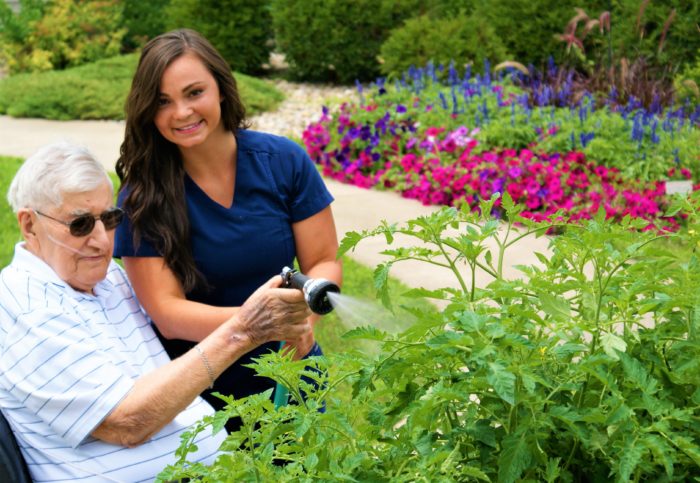Therapeutic Gardening Health Benefits
Therapeutic gardening, also known as horticulture therapy, is an activity that is spreading like a weed among seniors – with good reason. Feeling the warmth of the sun on our skin is always something Michiganders look forward to each Spring. When a cool breeze makes itself known it too is welcomed. And we all know that taking time to pause and smell the flowers has so much more benefit than the mere beauty to our optical and olfactory senses. Our own Michigan State University was the first to offer a degree in horticulture therapy starting back in the 1950’s while the first connection that digging in the soil had a curative effect was realized in 1768 by Benjamin Rush. 250 years and many research programs later, it is known that gardening can positively impact the mind and body holistically and provide seniors with natural pain and stress relief, as well as the bonus opportunity of social engagement. Green thumb or not, therapeutic gardening can provide seniors with a wide array of health benefits, and with the right adaptations, anyone can reap the benefits.
According to Denise Zebley, Proprietor at Cambrian Assisted Living & Memory Care, a senior living community in South Lyon, MI, the natural aging process makes seniors more prone to various health issues. So it is wonderful to know that taking time to cultivate and nurture plants, indoors or out, can yield reductions in depression and anxiety symptoms, general stress, changes in mood, as well as positively increasing quality of life, sense of community, physical activity levels, and cognitive function.
“For those living with dementia, therapeutic gardening can provide an outlet to get rid of stress and agitation while simultaneously giving a sense of responsibility and purpose,” says Denise. “Our use of horticulture therapy has allowed our residents to blossom, often turning gloomy moods into smiles showing the sense of satisfaction.”
Benefits of Therapeutic Gardening
Sue Sunderland, Executive Director at The Bridges at Warwick in Jamison, PA shares her research into this subject, as well as suggestions on how make adaptations to allow seniors to experience success with their efforts:
In an article about therapeutic gardening from Better Homes & Gardens Magazine (BHG), it is stated that throughout history, gardens “have been viewed as places of wonder, capable of restoring health and peace to those who entered.” Now, research and studies are backing up this widely-held belief.
Gardening can benefit seniors in the following ways:
-
- • Lifelong learning. For those who do not know how to garden, learning can become extremely beneficial. Not only do seniors gain a new skill and potential hobby, but they expand their knowledge of nature and learn how to nurture different types of plants. In the BHG article, it states that gardening might also have the ability to delay the onset of Alzheimer’s disease. This is because learning a new skill can activate new connections in the brain and provide a mental workout.
-
- • Accomplishment and self-worth. Gardening and being in control of the environment they are creating can help them feel as though they have some control over their lives, even when they feel like they do not have control over everything else. Therapeutic gardening also helps seniors feel like they have a purpose and they gain a sense of accomplishment when they can watch something they tended to grow.
- • Exercise. While we know gardening lowers stress levels, it can also make us happier. When seniors garden, they get exercise, which increases the levels of serotonin and dopamine which can make seniors happier, according to the Psychology Today article. The exercise that seniors get from working so vigorously to cultivate a garden can help to keep them healthier, allow them to sleep better and keep them physically and mentally fit.
- • Stress relief and relaxation. According to an article from Psychology Today, gardening is rhythmic in nature which allows seniors to relax and let things go. The article states that the anxious thoughts we have often have the tendency to ebb and flow with the movements of gardening and allows cortisol (stress) levels to decrease, which can help us clear our minds and settle our nerves.
- “While all of these benefits greatly impact seniors’ health, they also benefit from increased levels of socializing,” says Sue. “As many people enjoy nature and seeing or smelling flowers, they are more prone to stop to talk to someone that is gardening – if only just to comment on how beautiful their flowers are or how nicely their fruits or vegetables are coming up. This can add to a seniors’ boost in self-esteem and potentially help them to make new friends and connect with other people.”
How To Make Therapeutic Gardening Easier for Seniors
If you or a loved one are interested in taking up therapeutic gardening, there are a few ways to make it safer and easier. Consider the following tips on how to make gardening easier for seniors:
• Get the right tools. When planting flowers, fruits or vegetables that need to be in a container, opt for plastic instead of glass or ceramic so that they do not break. Ensure that your loved one has gloves and other materials needed in order to tend to the plants. If your loved one has Alzheimer’s or another form of dementia, make sure they do not have sharp garden tools, as they could accidentally hurt themselves.
• Adapt the height to make it easier. Since some seniors may have trouble kneeling or bending over in order to tend to the garden, consider raising it to meet their needs. Raised-bed gardens can allow seniors to work at a level they are comfortable with. Some raised-bed gardens can also provide built-in seating where seniors can relax, rest and meet with others. They can also allow them to work and tend while sitting down. If your loved one prefers to kneel and get their hands dirty, kneeler stools can help.
• Ensure plants are not toxic. If your loved one has a form of dementia such as Alzheimer’s, they may try to eat the plants, especially if there are herbs mixed into the garden with fruits and vegetables. In order to keep your loved one safe, try to not plant toxic forms of plants.
• If you would like to take advantage of the benefits of therapeutic gardening, but do not have outdoor space, try joining a gardening club or get involved in a community garden. The benefits that seniors could reap from this form of therapy are well worth cultivating.
Activity. Friendship. Support. Convenience. Value.
You’ll find all the above at Cambrian Senior Living located in the heart of Lyon Township in South Lyon, Michigan, where every day seniors are the center of everything we do. Our philosophy of “Pursuing Excellence & Providing Joy” means that our residents enjoy a sense of purpose and contentment along with fun, personalized care and a focus on total well-being. It is our goal to provide just the right amount of assistance to help our residents remain independent, while offering robust life-enriching programs such as gardening, along with a broad spectrum of care, hospitality services and amenities. Our dedication to total wellness – for mind, body and soul – is woven into our culture every day.
or call 248-344-0001 for more information or to arrange a personal tour.





Comments are closed here.